Title: Security Features of Utah Driver License: A Comprehensive Analysis
Title: Security Features of Utah Driver License: A Comprehensive Analysis
This article will provide an in-depth analysis of the security features included in the Utah Driver License. These features include holographic overlays, microprinting, UV printing, latent images, machine-readable zones, RFID technology, tamper-evident perforations, and thermal inks. Together, these security features provide strong protection against fraud and ensure the integrity of the Utah Driver License.
Introduction to Security Features of Utah Driver License or DL or ID
The Utah Driver License is the primary form of identification and proof of driving privileges in the state of Utah. It is issued by the Utah Department of Public Safety (DPS) to qualified individuals who meet the state's licensing requirements. In recent years, the design and security features of the Utah Driver License have undergone significant changes to combat fraud and improve the overall integrity of the document. This article will provide an in-depth analysis of the security features included in the Utah Driver License, discussing their purpose, function, and effectiveness in protecting the authenticity of the document.
Optical Security Features
Optical security features are a major component of the Utah Driver License design because they are both visible and invisible. These features include:
a. Holographic Overlay:
Utah driver's licenses feature a holographic overlay that includes the state's seal and the phrase "Utah Driver's License." This overlay is designed to be difficult to copy and help prevent counterfeiting.
b. Microprinting:
Microprinting is a technique used to print small, intricate text or images that are difficult to copy. Utah driver's licenses have microprinting on the front and back of the document that can be seen under a magnifying glass.
c. UV Printing:
Ultraviolet (UV) printing involves printing text or images that are invisible to the naked eye but can be seen under ultraviolet light. Utah driver's licenses include UV printing, which can be found on the front and back of the card.
d. Latent Image:
A latent image is a hidden image that only becomes visible when certain conditions are met, such as heat or pressure. The front of the Utah driver's license has a latent image that is revealed by scratching the surface with a fingernail or sharp object.
These optical security features make Utah driver's licenses more difficult to counterfeit because they require specialized equipment and knowledge to copy.
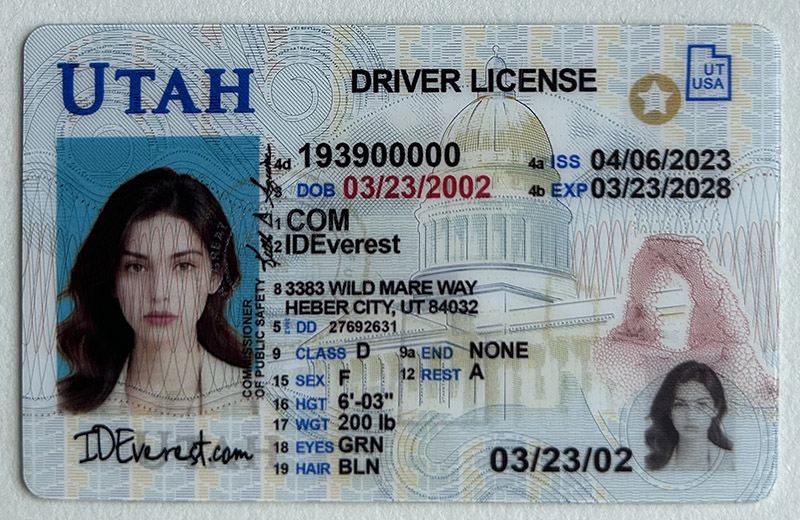
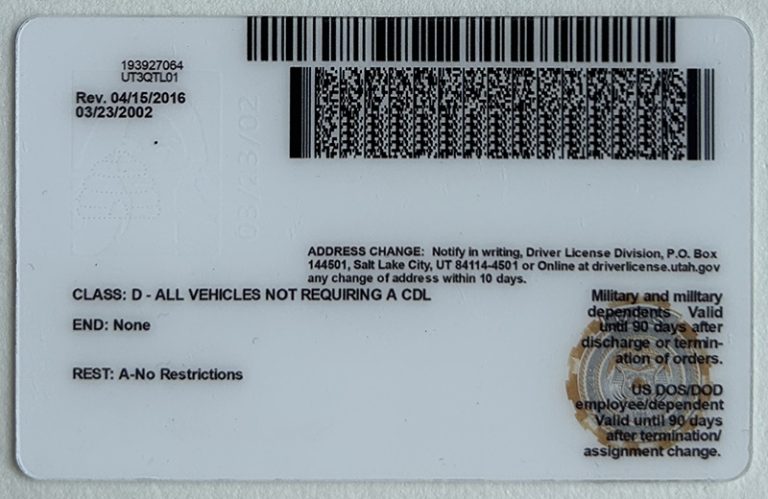
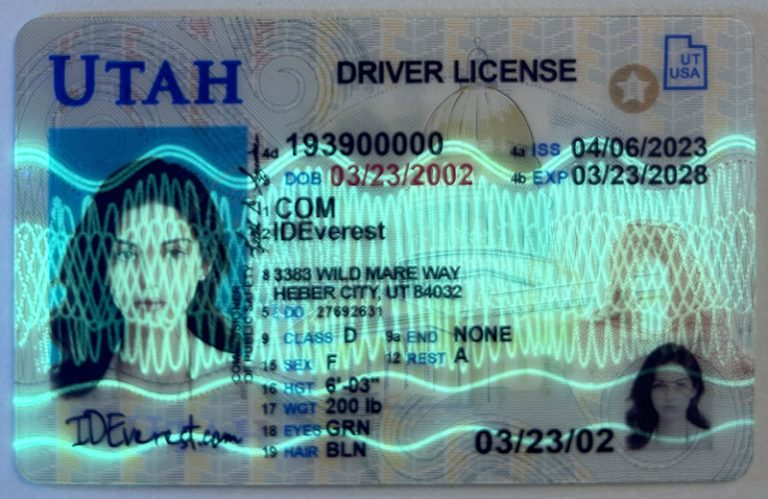
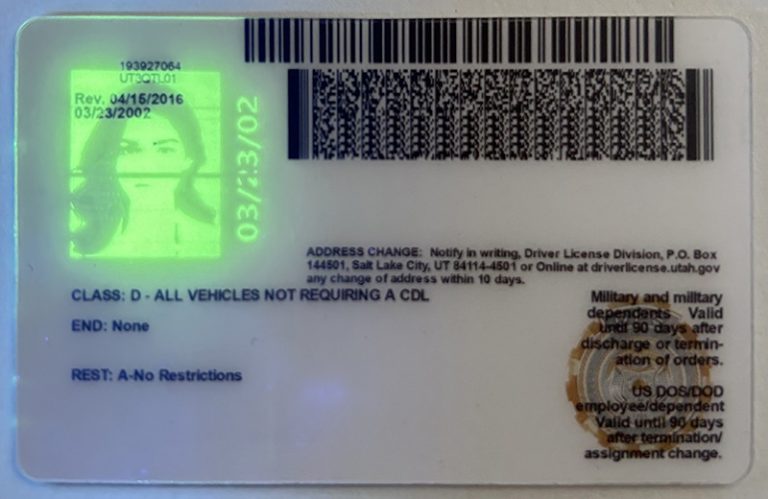
Machine Readable Zone (MRZ)
The back of the Utah driver's license has a machine readable zone (MRZ), which is a series of lines and spaces that contain encoded information about the cardholder. The MRZ is designed to be easily read by a machine, such as a scanner or barcode reader, and is used to verify the authenticity of the card. The information encoded in the MRZ includes the cardholder's name, date of birth, and license number.
RFID Technology
The Utah driver's license incorporates radio frequency identification (RFID) technology, which allows a compatible device, such as a smartphone or RFID reader, to read the card. The RFID chip contains the same information as the MRZ and can be read by devices that support this technology. RFID technology adds an extra layer of security to the Utah driver's license because it allows for real-time verification of the card's authenticity.
Anti-Tampering Features
Anti-tampering features are designed to detect any attempt to alter or forge a Utah driver's license. These features include:
a. Perforations:
The Utah driver's license has perforations along the edges. If the card is tampered with, the perforations will break, rendering the card invalid.
b. Thermal Ink:
The Utah driver's license is printed with thermal ink in certain areas. When these areas are heated, the ink changes color, indicating that the card has been tampered with.
c. Microperforations:
The Utah driver's license also includes microperforations, which are small perforations that can only be seen with a magnifying glass. If the card is tampered with, these microperforations will break, indicating that the authenticity of the card has been compromised.
These tamper-proof features are the last line of defense against counterfeiting and tampering because they make it very difficult for the card to be altered without being detected.
Summary of Security Features of a Utah Driver's License or DL or ID
The Utah driver's license contains a range of optical and electronic security features that are used to protect the authenticity of the document and prevent counterfeiting. These features include holographic overlays, microprinting, UV printing, latent images, machine-readable areas, RFID technology, tamper-proof perforations, and thermal inks. Together, these security features provide strong protection against fraud and ensure the integrity of the Utah driver's license.
What are the security features of the Utah Fake Scannable Driver License or DL or ID (Real ID Type) produced by IDeverest
The Utah Fake Scannable Driver License or DL or ID includes the date of birth printed on the card in red font as well as laser engraved on the card in larger font. The tamper-proof card includes a large primary license holder portrait as well as a smaller "ghost" portrait identical to the one issued by the Utah Department of Motor Vehicles.
The laser engraved ghost is repeated with the photo.
Laser ablation on top of the driver's photo.
Guilloche security design with waves and patterns printed in very fine lines that cannot be scanned or easily copied.
To create the scannable Utah fake driver license or DL or ID's Real ID Type, IDeverest uses a variety of techniques and tools, including:
Sophisticated Software:
IDeverest uses specialized software that allows them to replicate the exact design and all security features of a genuine Utah driver license. This software is not generally available to the public and is only available to professional ID makers.
Advanced High-Quality Printers:
IDeverest uses high-quality printers that are capable of printing at very high resolutions. IDeverest IDs feature crisp text, vibrant colors, and intricate designs that mimic real IDs. This ensures the IDs look as realistic as possible.
Machine Readable Passport (MRP): 100% Readable and Scannable
The 100% scannable fake Utah DL features a magnetic stripe and a barcode that contains the cardholder's personal information. IDeverest uses software to encode this information onto the fake ID's magnetic stripe and barcode. Once scanned, the ID will display the same information as a real ID.
High-Quality Polycarbonate or Teslin Material: Polycarbonate, Tamper-Proof Card Material
The standard type of scannable fake Utah driver's license or DL or ID is made of high-quality polycarbonate or Teslin material or tamper-proof material, just like the real thing, ensuring durability and longevity. The card itself is made of polycarbonate type plastic, which makes it resistant to damage and ensures it maintains the same appearance as the real thing over time.
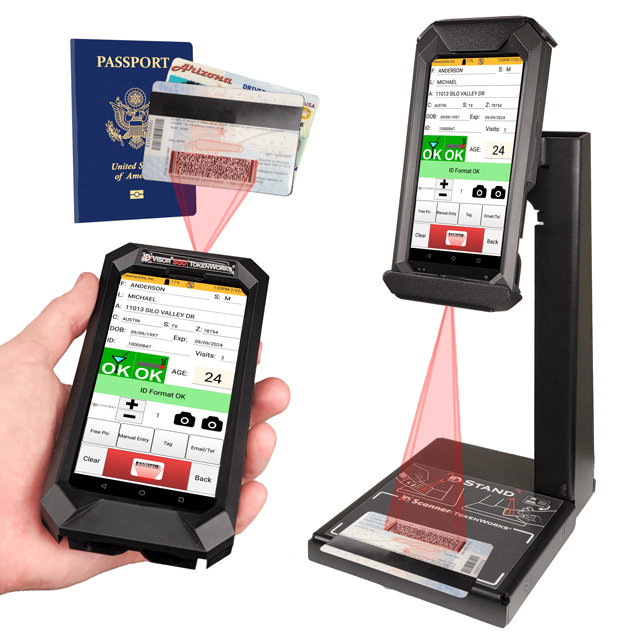
Holographic Overlay:
The Utah driver's license features a diagonal design with a holographic overlay of the Utah corporate logo covering a large portion of the front of the card.
Optically Variable Patterns and Variable Data Using UV (Ultraviolet) Ink:
IDeverest scans 100% authentic Utah fake IDs or driver's licenses or DLs containing features that change in appearance when you view the card from different angles, such as the state name, state seal, anchor, and UV (ultraviolet) printed stars and other images or text that are invisible to the naked eye, UV and micro-printing features enhance the authenticity of your ID.
Current License - Seal and first of three stars on the front fluoresce under UV, ghost image and date of birth on the back are visible under UV. Previous License: Repeated "UTAH" is visible under UV
UV effects on front (front: hexagonal pattern) and back (smaller portrait, date of birth)
Tactile Technology: Identifier, Date of Birth, Signature
Tactile elements used in multiple data locations, such as raised letters and numbers (e.g., name, date of birth), are difficult to replicate. Tactile Authentication: Multiple (Embossed Chrome Plate: Cardholder Name, Identifier)
Laser Engraving Ghost:
A faint, repetitive image in a photo that is only visible at close range.
Laser Ablation:
A laser-perforated pattern is used on the photo.
Lamination: Glasses are not allowed in the photo
The card is laminated with an optically variable pattern that includes the state motto, Keystone outline, and the year Utah ratified the U.S. Constitution.
1D & 2D Barcodes: Inventory Control Number and accompanying barcode
These contain data visible on the front of the card. 2D Barcode: The 2D barcode (2D) contains all driver's license information except the photo and signature. Barcode: The barcode corresponds to the driver's license number. The barcode contains demographic data and a unique identification number.
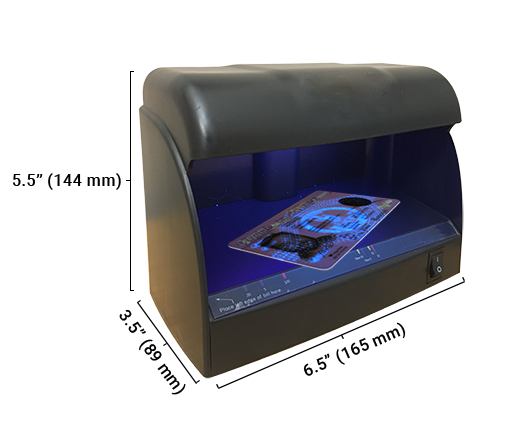
Portrait Photo:
The new design features a larger primary portrait and a smaller "ghost" portrait. Large primary license holder photo paired with a smaller "ghost" portrait.
Magnetic Stripe:
The card has a magnetic stripe that reads the cardholder's information.
Microprinting Technology:
There are three microprints on the ID of your Utah Driver License or DL or ID, which is very small print (text) that requires a magnifying glass to see. It is sometimes hidden in the background pattern of the Utah Driver License or DL or ID.
Other Detailed Features: Optional Real ID;
100% Real-Looking Scannable Fake Utah Driver License or DL or ID Card provides you with Real ID types to choose from. Gold Star: Utah Driver Licenses that meet Real ID requirements have a gold star in the upper right corner
You can count on us to get what you pay for - high quality 100% Real-Looking Scannable Utah Fake Driver License or DL or ID Card.



 How Fake IDs Promote Cultural
How Fake IDs Promote Cultural
 Importance of Getting a Driver
Importance of Getting a Driver
 A Night to Remember: Adventure
A Night to Remember: Adventure
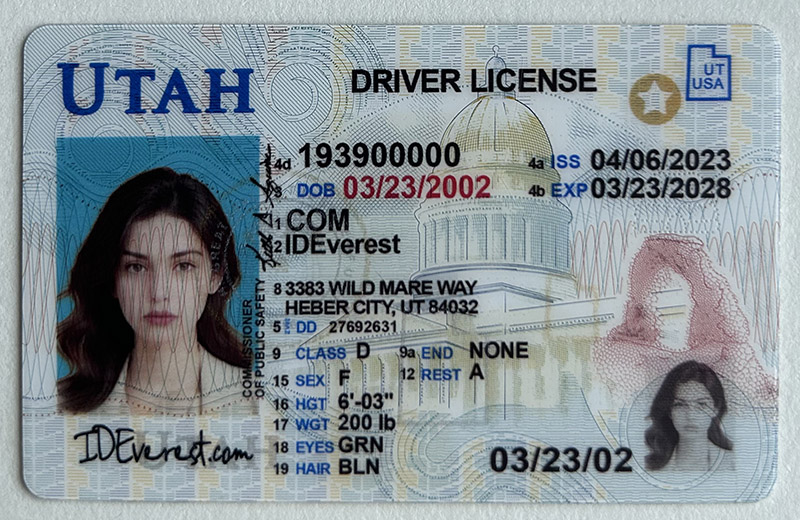 Title: Security Features of Ut
Title: Security Features of Ut